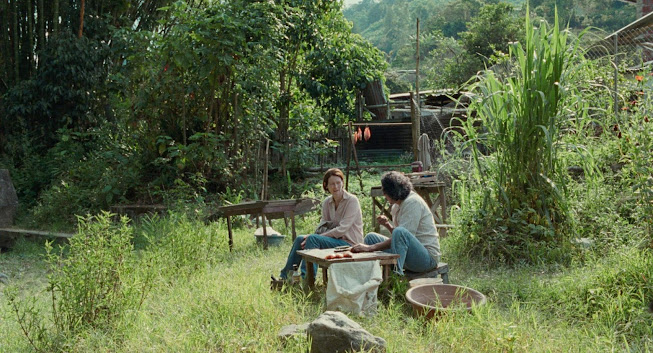Memoria starts with a locked off, very mundane shot of a curtain with a dark, triangular shape in the foreground. This holds for around a minute until an incredibly loud bang provokes the shape to move. This is the shoulder of Tilda Swinton's Jessica, and she slowly rises and wanders through her apartment, settling at a table next to some caged mice. Cut to a car park at night, where alarms start sounding and continue for what feels like ages. They eventually die out one by one, all held in a slow zooming shot. I admit to never having seen any of the director's (Apichatpong Weerasethakul) previous films, but if this is anything to go by, he's certainly a brazen chap.
The source of the loud bang is the nominal thrust of the film, as Jessica, almost half-heartedly, investigates the cause. But the noise is just a pretext for Weerasethakul (who also wrote the film) to explore ideas of displacement, disconnection, memory and the weight of history. Jessica is an English botanist (most of the press for this lists her as Scottish, but she sounds more English to me), working in Colombia, where her sister and sister's family also live. This is a very elliptical film, most of the decisions are made off-screen, and the setting suits its cryptic nature. Jessica is alien to this place, and her discombobulation affects the audience as well. She visits a sound mixer called Hernán (Juan Pablo Urrego) to try to pinpoint the exact noise. This is a great scene, maybe the most technical of the film, the rest hang somewhere between the oblique and the spiritual.
Audio is an important touchstone in Memoria. The soundtrack is filled with noises, from a creaking chair, incessant bug chirping, running water, to the recurring bang. There's a scene in a restaurant where the bang happens a few times, each one cranking up the tension, as Jessica's sister and family react to her reaction. Oddly mesmerising. Incidentally, the bang Jessica hears is actually a phenomenon called 'Exploding Head Syndrome'. Yep, really. Anyway, the constancy of sound is highlighted near the end when Jessica puts her hands to her head and ALL sound disappears from the film for a moment - it's a neat trick by the director.
The look of the film is simple, even perfunctory at times, yet comfortingly rich at others. The aforementioned long takes are there throughout, and though ponderous (and sometimes boring), they match the feel of the film. At one point, Salvador Dalí is mentioned by a doctor and the events following this would certainly fit the Surrealism genre, though some of the shots border on Abstract Expressionism or maybe Suprematism, in their near rejection of art.
Jessica's search takes her to the jungle, accompanying an archaeologist friend, where she meets another Hernán (Elkin Díaz), who helps her 'discover' the source of the bang. The film does something odd here. It slows down dramatically, while also speeding up the resolution. Look, I'll come clean, there's a lot to unpack in this film, and quite frankly, I'm not up to the task. It's maddening, unsettling, almost a psychological horror, and close to a piss-take at times, but if you can go with it, you might just be rewarded. There are enough enigmatic touches to maintain curiosity levels.
Memoria is showing at the Somerville Auditorium at UWA for the Perth Festival from Jan 24-30.
See also:
The 'hidden' style reminds me of Michael Haneke's, Caché (2005), and the beauty of the landscapes and atmosphere bring to mind Ahn Hung Tran's, The Vertical Ray of the Sun (2000).


Comments
Post a Comment